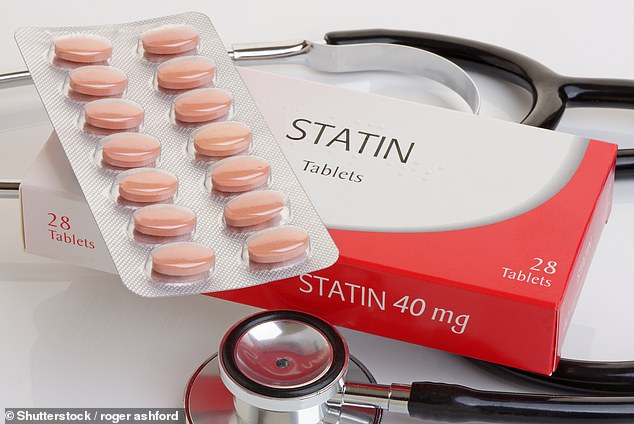The culprit behind your embarrassing weight gain could be hiding in your medicine cabinet.
Prescription drugs often come with long lists of side effects, ranging from infections to rashes to suicidal thoughts.
And while it’s well known that some, like steroids, can make you gain weight, other commonly prescribed medications, like certain painkillers, can come as a surprise.
Pharmacists have revealed to DailyMail.com the most commonly taken medications you didn’t know were making you fat – including some that could increase your waistline by up to five pounds in just a few months.

Pharmacists have revealed to DailyMail.com which drugs could be causing your worrying weight gain

Antidepressants
Antidepressants have been accused of causing a host of side effects, from insomnia to headaches to even killing patients’ sex lives.
However, certain classes of these drugs have also been shown to cause weight gain.
Dr HaVy Ngo-Hamilton, a clinical consultant at BuzzRx and a pharmacist at the University of Minnesota Medical Center, told DailyMail.com that these were largely tricyclic antidepressants, an older class of drugs than the more common selective serotonin reuptake inhibitors (SSRIs).
“Tricyclic antidepressants, or TCAs, are the class of antidepressants that cause the most weight gain,” she said. “As far as weight gain goes, I try to avoid TCAs as much as possible.”
She noted that TCAs are prescribed less often than newer SSRIs because of more severe side effects, including insomnia, bedwetting and chronic pain conditions such as fibromyalgia.
Some of the most common examples include amitriptyline and nortriptyline.
Dr. Ngo-Hamilton estimates that a patient taking these drugs can gain about two pounds a month.
However, she also noted that antidepressants could cause weight gain due to improved mood.
A patient may have had little desire to eat, and because the medication regulates their production of the happy hormone serotonin, they may increase their appetite.
Antipsychotics
Along the same lines, antipsychotic medications such as clozapine, risperidone, and olanzapine may be prescribed for patients with serious health conditions such as schizophrenia and bipolar disorder, as well as some patients with dementia.
“Antipsychotics lower our body’s metabolic rate,” Dr. Ngo-Hamilton said.
This is the amount of energy you expend while resting. A person with a slower metabolism may therefore burn fewer calories because the body converts food into energy at a slower rate.
Dr. Ngo-Hamilton noted that these medications can also cause sedation and lethargy, making the patient less likely to exercise or follow a proper diet. Some of this weight gain could also be due to urinary retention, a known side effect of antipsychotics that prevents the kidneys from properly removing toxins and waste from urine.
She named clozapine (Clozaril) as the most common culprit in this category.
Anticonvulsants
Medicines that reduce the frequency of seizures and nerve pain may also cause weight gain in some patients.
Dr. Ngo-Hamilton cited gabapentin as an example, which fights seizures by reducing abnormal signals in the brain, but other drugs such as pregabalin (Lyrica) and carbamazepine (Tegretol), prescribed to people with spinal cord injuries, could cause similar effects.
However, “the mechanism by which anticonvulsants cause weight gain is unclear,” Dr. Ngo-Hamilton said.
Recent research has put forward several theories, including increased appetite, slowed metabolism, water retention, and disruption of hunger and satiety hormones by the drug.
Dr. Ngo-Hamilton estimates that patients taking these drugs can gain about five pounds in the first few months of taking them.
Beta-blockers
Beta-blockers are medications designed to lower blood pressure and block the effects of the hormone epinephrine, or adrenaline. This helps improve blood flow and reduce heart rate.
Dr. Ngo-Hamilton noted that several “older” beta-blockers such as metoprolol, atenolol (Tenormin) and propranolol have been shown to cause weight gain.
However, as with anticonvulsants, the exact mechanism is still unclear. Dr. Ngo-Hamilton noted that one theory is that these drugs decrease metabolic rate, like antipsychotic drugs.
Additionally, some data suggest that because beta-blockers decrease blood pressure and the amount of blood pumped by the heart, patients may become tired and have difficulty exercising.
Dr. Ngo-Hamilton estimates that a patient can gain two to three pounds of weight in the first six months of taking one of these older beta-blockers.
Corticosteroids
Corticosteroids are medications taken to reduce inflammation in the body.
The most common examples are prednisone and dexamethasone, which work by mimicking the effects of the hormone cortisol – which the body releases when stressed or injured – to reduce inflammation.
They are different from anabolic steroids, which increase testosterone levels to improve athletic performance.
Corticosteroids are usually only taken for a few days at a time, although they may be prescribed long-term for certain conditions such as autoimmune diseases.
“I’m not concerned that these drugs will cause weight gain in someone who takes them for a few days. It’s people who have to take steroids chronically who experience weight gain,” Dr. Ngo-Hamilton said.
She noted that a common side effect is “moon face,” which leads to a round, full, and puffy face. And mimicking cortisol can also lead to increased appetite.
Dr. Ngo-Hamilton noted that a patient taking steroids for a year could gain up to 10 pounds.
Contraceptive injections
Hormonal contraception has long been demonized for causing weight gain, although Dr. Ngo-Hamilton warns that most contraceptives do not cause weight gain.
“Women who take birth control and gain weight are primarily due to fluctuations in estrogen levels,” she explained.
However, a form of birth control called Depo-Provera (Depo-Provera injection) has been shown to cause weight gain. This is an injection containing progesterone given once every three months.
The drug’s label says that nearly 38 percent of women in clinical trials lost more than 10 pounds after using the contraceptive for two years.
Additionally, an older study found that the drug caused an average weight gain of 20 pounds over 18 months.
Dr Ngo-Hamilton estimates that most patients would gain between four and five pounds a year.
Statins

About one in five Americans take statins, which some research suggests may lead to weight gain
About 47 million Americans take statins, a cholesterol-lowering drug, making it one of the most popular medications in the United States.
Statins work by limiting the production of “bad cholesterol” (low-density lipoprotein (LDL) cholesterol), which can harden and narrow arteries and increase the risk of cardiovascular disease.
“It can cause some slight weight gain, but that’s very rare,” Dr. Ngo-Hamilton said.
A study published in JAMA Internal Medicine, for example, found that patients taking statins gained between six and 11 pounds compared to those not taking them over a ten-year period.
However, the evidence is limited, Dr. Ngo-Hamilton cautions. She also points out that cheap drugs, which lower cholesterol and the risk of diseases like heart disease, are not worth stopping because of the risk of weight gain.
“The benefits clearly outweigh the risk of a little weight gain,” she said.
